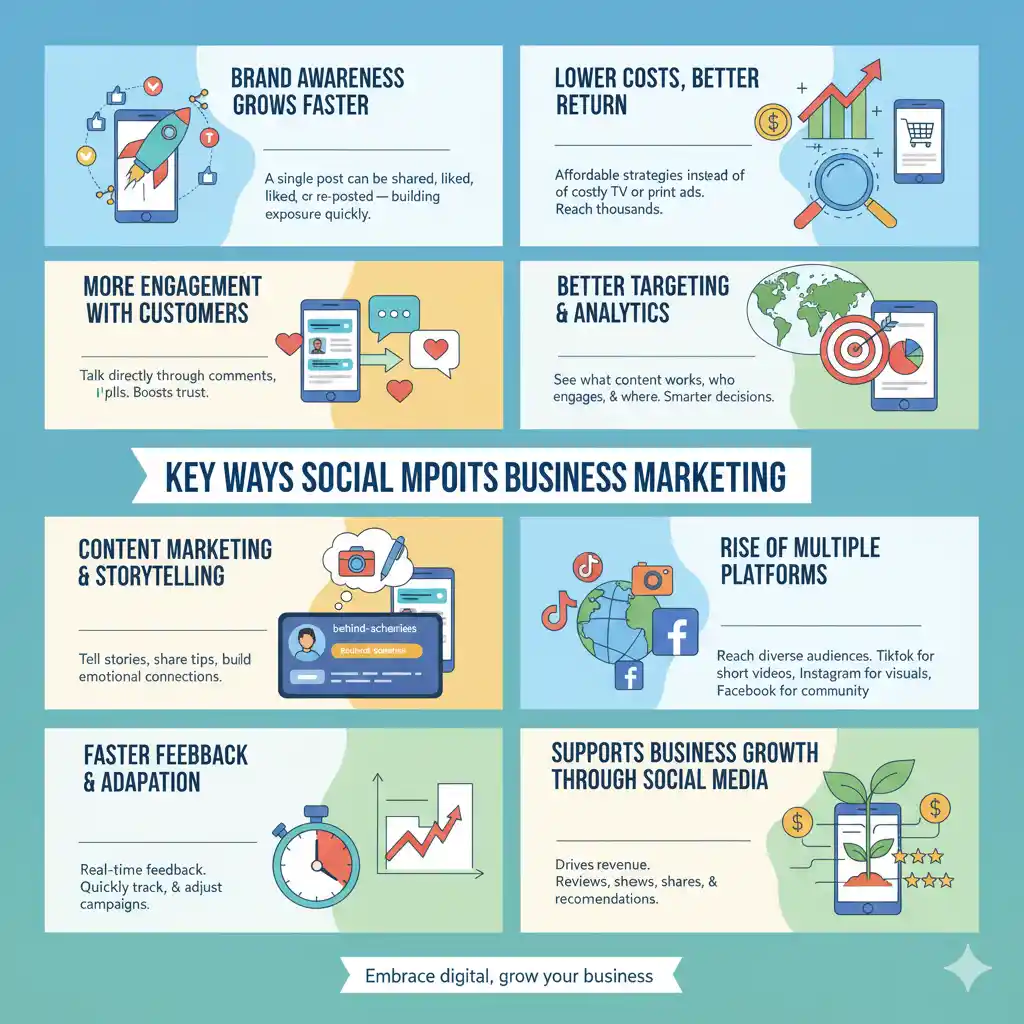Over the past decade, social media has completely transformed how small businesses promote themselves. Knowing how to use social media marketing effectively can make the difference between staying small or growing fast. In this article, we’ll explain how social media has impacted marketing for small businesses and how you can use it to build brand awareness, connect with customers, and drive real growth.
What Is Social Media Marketing for Small Businesses?
Social media marketing is all about using platforms like Facebook, Instagram, TikTok, and others to share posts, ads, and stories that connect with your audience. For small businesses, it’s a way to show your brand’s personality, reach new customers, and build lasting relationships — all through digital tools that are easy to access. It’s one of the most important parts of digital marketing for small businesses.
In the past, small business marketing relied mostly on local ads, word of mouth, and in-person visibility. But things have changed. Now, effective online marketing strategies include creating regular posts, replying to messages, running paid campaigns, and partnering with influencers. Even with a limited budget, small businesses can use affordable marketing tools to compete with much larger brands.
Key Ways Social Media Impacts Small Business Marketing

Brand Awareness Grows Faster
Social media advertising, influencer marketing, and content marketing let small brands reach many people. A single post can be shared, liked, or re-posted — building exposure quickly.
To understand how strong branding shapes success, check out what marketing really means for business growth.
Lower Costs, Better Return
Small businesses can use affordable strategies instead of costly TV or print ads. Running a Facebook or Instagram ad can be inexpensive and still reach thousands. Creating content yourself, like videos or images, saves money. Influencer collaborations, especially with micro-influencers, often deliver great results for lower cost.
If you’re just starting out, here’s how to start a small business effectively and make every marketing dollar count.
More Engagement with Customers
Social media allows small businesses to talk directly with customers through comments, DMs, polls, and live videos. This boosts customer engagement and trust. When people feel heard, they’re more likely to become loyal customers.
Want more customer-focused strategies? Read about free marketing ideas for small businesses.
Better Targeting & Analytics
Social media analytics let you see what content works, who engages, and where your audience comes from. Platforms like Facebook, Instagram, and TikTok let you target ads by interests, age, and location — improving your ROI through smarter decisions.
To learn more about optimizing reach, explore SEO in digital marketing.
Content Marketing & Storytelling
Instead of only promoting products, small businesses now tell stories, share tips, and post behind-the-scenes moments. This approach builds stronger emotional connections with audiences.
If you’re developing your content strategy, see what the 4Ps of marketing are and how they shape a successful brand.
Rise of Multiple Platforms
Using more than one platform helps businesses reach diverse audiences. TikTok for Business attracts younger users with creative short videos, while Instagram marketing excels with visuals. Facebook remains strong for local engagement and community building.
Learn more about marketing strategies for local small businesses to grow your local reach effectively.
Faster Feedback & Adaptation
Social media gives real-time feedback. Small businesses can quickly test what works, track responses, and adjust campaigns. This agility helps maintain a strong digital presence and stay on top of trends.
Supports Business Growth Through Social Media
Social media directly drives revenue for many small businesses. Reviews, shares, and recommendations all influence buying decisions. By embracing consistent posting and customer interaction, you can see real business growth through social media.
Challenges Small Businesses Face in Social Media Marketing
While social media offers huge benefits, it also brings challenges:
Consistency – Posting regularly and replying to customers takes time.
Measuring ROI – Even with analytics, linking social efforts to sales can be tricky.
Budget limits – Paid ads can add up in competitive industries.
Keeping up with trends – Platforms evolve fast, so small businesses must stay adaptable.
If you’re planning a broader marketing strategy, see how to write a business plan that includes social media goals.
Real-World Examples & Statistics
About 96% of small businesses use social media in their marketing strategy.
Around 41% of local businesses say social media helps them drive revenue.
90% of marketers report that social media marketing increased exposure for their business.
Small businesses using social media to find new customers often see revenue grow by up to 20%.
You can also learn from these small business ideas with low investment and high profit if you’re planning to expand.
Why the Focus Keyword and Related Keywords Work Together
When writing about how social media has impacted marketing for small businesses, you naturally include connected ideas like social media advertising, influencer marketing, social media analytics, and digital presence.
To strengthen your strategy, see digital marketing strategies for small business growth.
Conclusion
Social media has completely changed how small businesses market themselves. It helps build brand awareness on a budget, connect directly with customers, and share stories through creative content and influencer partnerships. With the help of analytics, small business owners can track what’s working and improve faster than ever.By using smart social media advertising, staying active on the right platforms, and keeping up with new trends, businesses can build strong customer relationships and long-term success. When you embrace online marketing and maximize your digital presence, social media becomes one of the most powerful tools for real business growth.